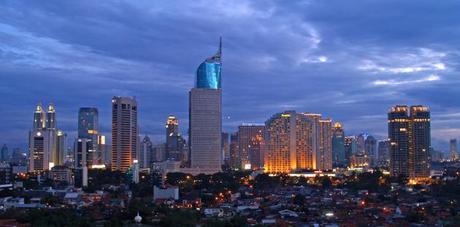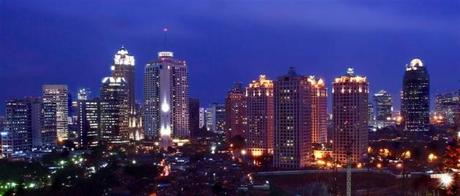
A highly sanitized version of Jakarta
It has been nearly 14 years since Indonesians overthrew President Suharto in a people-power revolt of 1998 following the Asian Financial Crisis. Since then, the country has moved on towards becoming the most democratic country in Southeast Asia, voting in 3 Presidents in peaceful elections and escaping the bloody power transitions that gripped so much of the developing world’s young democracies. The country has defied all expectations. When the world’s think thanks were expecting that Indonesia would balkanize following the fall of Suharto’s dictatorship, the country’s more than 200 million people (242 million today), of 300 ethnic groups speaking 250 different languages across 18,000 islands, remained as one nation. When the world was expecting an Islamist takeover at the elections, Indonesian voters showed otherwise, punishing Islamic parties at election after election.
That said, despite its vibrancy, the Indonesian democracy is still a fledgling democracy. Many of the privileges and functions of government that people in the developed world take for granted does not exist or at least inconsequential in Indonesia. We might have guarantees of civil liberties in the constitution but apparently it doesn’t extend much to those with grievances in the far-flung provinces or those without the money to purchase the enforcers to those guarantees. Our voter participation at Presidential elections might be high but so are the amount of money used to sway those voters. And let’s not forget how expensive it is to become a civil servant. Yes, you have to pay to get the job! Talk about giving incentives for corruption.

A highly sanitized and glittering version of Jakarta
Alas, all of the problems with the political democracy holds nothing to the problems of economic democracy, or rather lack thereof. Any administration, any state wishing to survive must understand that economic progress is a paramount objective. Without it, not only will the state be susceptible to overthrow, but the system that the state adopts will carry a stigma through association. In this case, the continuity of political democracy in Indonesia is dependent upon improving the livelihood of its citizens, that is, improving economic democracy in the country. After all, giving a poor man the chance to voice his grievances might make him happy, but how long would that happiness last on an empty stomach?
Economic democracy is a condition whereby the people have access to abundant opportunities to work, invest, buy and sell in a free market. It is a condition that has yet to exist in Indonesia. The fact that more than half of Indonesia’s workforce are employed in the informal sector is prove of the chronic lack of employment (and therefore, opportunities). Having had some experience of doing business in Indonesia, I can testify to the difficulty of doing business in Indonesia without going through the channels of personal connections. Businessmen seldom trust those outside their circle of family and friends to important appointments and business deals, contributing to the disappointment that is the country’s inability to fulfill its growth potential (the other reasons are of course, massive red tape and public sector corruption).
However, that does not mean that I am placing the blame on Indonesia’s businessmen for not spreading the opportunities to a greater talent pool (well, not mostly, at least). After all, businessmen can only run their businesses based on the laws of the land (cultural norms). Like a ship that will have to navigate depending on the conditions of the sea, businesses that seek to run against the established order risks being sunk into bankruptcy. The problem here lies almost entirely with the government. Why is it that Indonesia’s business community capable only of doing business with their families and close friends? That is indeed the same practice you can see in other developing countries and might I add, it applies to developed nations as well, though to a much lesser degree. The reason is something I’ve mentioned before, trust. That’s right, trust.
Any party would want to ensure that their business proceeds, that they are not scammed or undercut. That is why business contracts are always made between trusting parties. In developed nations, contracts can be made between two complete strangers because there is trust. It might not be trust that the strangers have for each other but they do trust the law and the nation’s justice system to enforce that contract. Such that in case of breach of contract, the case can be brought before the court and settled for a bargain vis-a-vis the contract’s value. But in Indonesia, enforcing contracts through the courts are often far more expensive and time-consuming than is the contracts’ worth. With no trustworthy justice system, people turn to the only other channel of trust to do business, personal trust.
As such, the fact that businesses in Indonesia is mostly done through channels of personal trust is really a vote of no-confidence that the business community has cast on the country’s justice system and it’s (lack of) rule of law. For as long as successive administrations continue to rule by law rather than provide the rule of law by which Indonesia shall run, this problem will continue to persist and with it, the disappointing economic growth that in no way, reflects Indonesia’s true potential. Of course, it cannot last forever, something eventually has to give in, something eventually has to disappear. Whether that would be the existence of the political democracy or the nonexistence of the economic democracy, only time will tell.

